I was chatting with Maria a few days ago when I was reminded of that old piece of wisdom, “Never say never”. The reason is simple, if you say that, then you have cursed yourself that one day you will do that thing. Chances are you’ll also want to do it at the time. I dont know if this curse is a kind of self-fulfilling prophecy; that once you utter the words some evil part of your unconscious remembers them to use against you later. Maybe its just a sign that as you learn new things and meet new people, your world view will inevitably change. Its a sign that you are growing and changing as a person. Or maybe its just that I’m the kind of person who can’t bear to be told I can’t do something, even when I’m doing the telling. The curse has proven disturbingly true for me for as long as I can remember.
When I was about twelve I was vehement that people who took any kind of drugs were just stupid and that I’d NEVER do anything that dumb. When I was nineteen and twenty, I was exploring the paths of extra-chemicular activity at some length; always remembering that I said I’d never do that. Curiously, at the time I was doing that, I hated people who were drunk. They acted like reptiles and I couldn’t think of anything worse. I’d NEVER be like them. NEVER. It seemed inevitable then, that at some point in my future I would be staggering around St Petersburg at six in the morning unable to even walk upright.
Both times I simply couldn’t picture myself in that situation and both times found myself there after a natural flow of changes over the course of time. So it is now that I find myself sitting in Jakarta airport waiting for my flight to Singapore. I’ve already started working for my old company in the job that will become permanent in a few weeks. I’ll be in Singapore for quite a while I think and I’m l0oking forward to it. Living and working in a new country will be a whole new experience for me. Being so central to south east asia means the idea of weekend trips to Vietnam, Thailand, Laos, Cambodia and Malaysia is both cheap, quick and will definitely be a part of my life for years to come. Travelling to Indonesia is likely to be even more common to meet with my girlfriend and explore the country. The thought is thrilling, but laced with conservatism. I’ll have a good job in my chosen industry a nice apartment and probably matching curtains. However, I also discovered that you can own chameleons in Singapore, something I’ll be looking into pretty shortly.
So why on earth would I bring that up? Well, the truth must be obvious. When I left Darwin ten years ago, heading for Melbourne, I was offered a chance to find work in Singapore. At the time I said I’d never go there for work, or anything really. I just couldn’t picture myself in that situation. So here I am setting up the next part of my ever changing existence to be close to my girlfriend until we end up together more permanently. To be living and working in another country, something I’ve been wanting to do for a few years now. But best of all, none of that will change my ability to travel, in fact, it actually improves it beyond all measure. It never ceases to amaze me what a change time can bring.
So there’s only one thing left to say. I will NEVER be one of those damn health nuts who eats properly and exercises daily. I will NEVER be that kind of smug git who glows with radiant vigour and knows it. I just can’t see myself in that situation.
So we’re finally aboard our first true Trans-Siberian train out of Moscow. Yekaterinburg is about thirty hours away and we sleep long after the sun comes up. I should take a moment to describe the main inter-city trains that run on the Trans-Siberian line. The wagons come in different types for different budgets. First class has two beds in a room that’s about two and half metres wide, about two metres deep and about two and a half metres high. Second class has four beds in the same sized room, two on each side bunk style and ‘platzkart’ is open slather with small bunk beds stacked to the ceiling everywhere and first in best dressed ‘seating’ allocations. Typically the last option is used by people when they’re young and crazy, on sporting or army trips, or for people who just can’t afford the more expensive options. The second class wagons are the most common, typically with Russian families and holidaymakers travelling around their own country. First class wagons are normally used by foreigners and business travellers who don’t especially want to be a part of the train communities.
The trains that run the Trans-Siberian line are little villages in their own right. They have policemen, caretakers, cleaners, janitors, open trading, shops, pubs, cafes and a culture that belongs to the people travelling on them. Somehow almost all the above is performed in and around everyone’s cabin. The formal commerce on the train is the single dining car, but the provodnitsas often branch into selling food and drinks from their room. Every wagon has its own style and atmosphere that changes with the travellers present, but is also dominated by the provodnika (male) or provodnitsa (female). There are typically two per wagon taking turns in being awake and responsible for everything and everyone on their wagon. They look after the samovar, clean and provision the toilets, clean the corridor in the wagon, empty the bins and organise everyone. When you board the train they check your tickets and passport and let you wrangle your bags into your cabin. At some point soon after, normally once the train is moving, they will appear with your sheets and pillowcase for your bed – unless you are at the train’s origin point, in which case beds are normally already made. They may well charge you for the privilege of handing you your bedclothes; and that part isn’t optional – you can’t just use your own. Lucky it’s less than a hundred roubles (AUD$5), so not really worth worrying about. Consider it a tip, because at any time of the day or night they are at your service for just about anything. They will also come and find you about an hour before you arrive at your station and advise you to get ready. This means you pack your life back into your bags and give all the bedclothes back to them and hope you’re going to find your way to the next place you will sleep. They keep the toilets in good condition and you can always ask them for more if the paper runs low. The toilet floor is always covered with rubber mesh matting that means you effectively stand a centimetre above the metal floor. This is particularly good when someone has used it to have a simple shower. We only ever found one real shower fitting on a Trans-Siberian train and that wasn’t until the last leg of the journey heading into Vladivostok. You can always use the tap and sink to have a simple wash down if you’re feeling dirty.
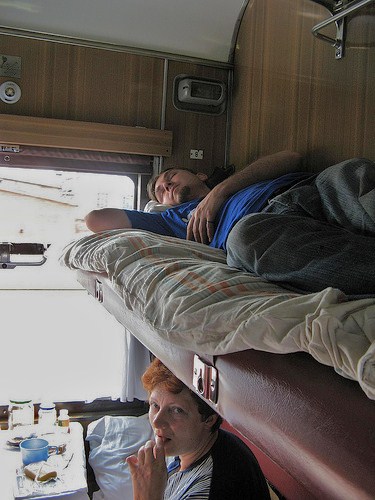 2nd class cabin, now with sleeping Don The samovar sits outside the provodnitsa’s room. I’m going to say provodnitsa from here on in, because the vast majority are women of all ages and varieties. From glamour girls (unusual) to middle aged babushkas in training (common) they always lend an extra atmosphere and style to their wagon. In any case, the samovar is the hot water service used by everyone to make tea, soup, noodles and anything else that can be created with the aid of hot water. It does become one of the congregation points on the wagon and I share many broken conversations across the country in my terrible Russian combined with their average English. They generally follow this format and start with them asking me a simple question:
<in Russian> “Where are you from? I’m Russian.”
Normally this is repeated a couple of times while my incredibly slow comprehension deciphers what’s being asked.
<in Russian> “I’m from Australia”, or, “I’m an Australian man.”
This is met with the obligatory raised eyebrow, incredulous smile and exclamation,
<in Russian> “Australia!”
<in Russian> “Yes. I live in Perth.”
That exchange is inevitably followed by a long and detailed explanation of where exactly Perth is in the country and that it is bigger than all but three Russian cities. This normally gets a good reaction once I explain it. It’s like I’m revealing the secret location of a vast new world they’ve never considered. Which is probably not that far from the truth. After meeting people from many countries on different continents it is clear that Australia exists as a strange, very distant and possibly imaginary place that may, or may not, contain people to balance out the magical wildlife like Kangaroos and Koalas. Some of the time, this conversation leads to the Russians telling me about how amazing New Zealand is and I have to inform them that they’re really talking about Australia. Generally, my conversations with Russians at the samovar would falter at that point. Sometimes we figure out what our professions are, sometimes I’d get to meet the whole family soon afterwards; but always we finish our noodles in peace first.
There is a small room at each end of the wagon with a huge heavy door leading into the connecting platform for the next wagon. Between the two heavy doors are two metal plates, one attached to each wagon, that move up and down independently and provide an amusing ride at two in the morning whilst navigating the train’s nightlife. Either side of the actual connection point between the wagons, there is a room. One of these rooms is a clear space; the other is the smokers place. At any time of the day or night, there will be someone in this spot enjoying a quiet cigarette. If there isn’t, you can just wait a few minutes; at least one will always mysteriously appear. This was one of the other primary meeting places for people travelling the Trans-Siberian. It seems the majority of Russians smoke and you can certainly smoke pretty well anywhere in the country except inside the wagons of these trains and on Metro platforms.
On many of the trains you can’t open the window in your cabin at all. When the air-conditioning is operating, this works out fine and they’re very comfortable. When approaching stations that we will stop at, they turn the air-conditioning off until we are moving away from them again. For the two minute stops, this is fine, but for the half hour ones this turns the whole wagon into a sauna. Thankfully you could open the top section of half of the windows in the corridor, each one giving enough space for three adults to stand in them and breathe the cool, sweet air outside. This joy would last only until the provodnitsa arrived again to order that they all be shut so the air-conditioner could work its magic. This was a great time to disappear into the spaces between the carriages and enjoy the airflow there, since you can always open those windows. Your other option is to show a camera to the provodnitsa and claim to be taking a photo opportunity through the open window; that normally gets you another five minutes of fresh air.
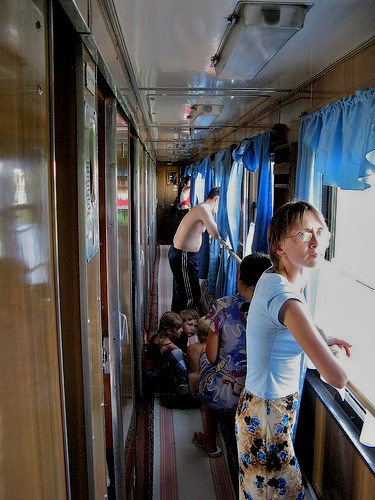 Wagon corridor, the kids and tracksuit bottomed man are standard.. So sometime late on Thursday morning I find myself sitting at the table between the two lower bunks munching my way through a curious meal that had been delivered by the provodnitsa. It features some rice with some kind of meat, bread and salad. A bottle of water completed the breakfast set. I have no idea if this is normal, part of the ticket, or someone’s attempt to make a little extra money on the side. Lari was sure it would trigger them to ask us for more money, but our Russian friend helps us understand that it is a part of our ticket price; this was one reason why the provodnitsa had taken our tickets into her room the night before and looked over them at some length. He then refuses his meal when she tries to hand it to him. Not knowing whether to follow his example or not, I opened it and enjoyed eating the simple food. Not amazing, but filling and stodgy; something Russian food is good for. The open countryside passing by the window forms the perfect backdrop for the calm morning meal. Forests give way to the occasional river and village with farmland and plains inbetween. We pass through larger towns from time to time and stop in about half of them. The stops are often only for a few minutes; just enough time to load and unload passengers.
Lari watches me eating for a while, then starts picking at the salad as Don slowly wakes up. We all confer on whether or not he should eat it,
“It’s too late for me and if I get sick I promise to share the love”, I volunteer.
“Do I get your music machine setup when you die?”, Don asks expectantly.
“No. I’m giving everything to charity. Except my collection of hats, which goes to Lari.”
“Thanks man”, Lari says with mock happiness, wondering what she’d done to deserve them.
“Bloody favouritism”, Don mutters, “It’s because she’s a chick isn’t it?”
“Well, you have to agree her breasts are much nicer than yours, actually her body is WAY better than yours all up, but you do have longer hair happening…Donnifer”. He scowls, then smiles and raises his middle finger pretending to scratch his nose.
“Thanks again…I think”, Lari offers as Don shrugs and eats his meal nonchalantly.
Then Don starts talking about the photos he got of himself holding large cats in Mocow. I had seen them while transferring everything to Alisha’s laptop, so he gives Lari his camera and says,
“They’re all on there, have a look.”
Don and I then start talking about their hosts in Yekaterinburg. Don and Lari will be Couchsurfing with a couple who live in an apartment on the edge of the city. They seem a happy couple who have hosted people before, so they’re all looking forward to the next experience. Lari looks up and says,
“There are no pictures of you with cats here.”
Don and I look at each other confused and Don grabs the camera back from her. He looks focussed and baffled as he searches for them and then looks up again to announce,
“None of my pictures from Moscow are here.”
I take my turn looking at the camera in incomprehension. The pictures finish around the time I was copying them onto Alisha’s computer. In a flash I realise I had told the computer to ‘Move’ them instead of ‘Copy’ them. So it was that ten year’s of IT industry experience flew pointlessly out the window of the train into the Russian countryside.
We spend the afternoon catching up on each other’s lives. As we make some more ham and salami rolls we notice that the salami stained our hands last night, when we’d cut it with don’s pocketknife. We wonder what’s in it that is doing that and then wonder if we really want to be eating it. We finish it anyway. Don and Lari lie down for a while and I start to investigate the corridor of the train. I find a strange document posted on the wall, written in Russian. I examine it for a long time before understanding that it’s a timetable listing when we will stop at all the stations along the way. I notice some stops are longer or shorter and try to make sense of the place names for a while. I then return to the cabin to find Lari sitting up and writing in her notebook.
“I’m going to get off the train at the next stop and buy some beer”, I announce suddenly.
“Okay, are you sure? Will there be enough time?”
“I hope so. I think I’ve understood the timetable on the wall out there.”
I only have to wait another twenty minutes before we start slowing down for the station. I’m waiting to exit when the provodnitsa says something I don’t understand. I smile and nod anyway, focussing on the mission at hand. After we stop, she folds down the stairs and helps another person disembark as I race onto the platform with my heart beating fast. If the train leaves me behind I’m going to be in a fair bit of trouble…..and I’ve read that it will do exactly that if I’m late. I would have to find another ticket, which is the thing that scares me most out here. They wont speak English, I won’t be able to explain very much and maybe there won’t be mobile phone reception so I can’t beg for help from a Couchsurfer either. I feel the pressure of the risk on me as I join the queue of other people from the train lining up at a pavement shop for supplies. I feel happier to see the provodnitsa from the next wagon directly in front of me. I won’t take long to serve and I’m sure it should be alright. The line takes forever as we all enjoy a little more queuing and genuine Russian service. To make it worse the provodnitsa is stocking up on one of everything in the shop and taking a long time. I turn to check the train more and more often, starting to think I should just give up and make a dash for it. No. There’s people behind me still, at least five. Oh no. Two people from the back of the queue give up and head for the train. I turn back to see its my turn. I go into overdrive, ordering six cans of Nevskoe beer and I even check that they’re cold. I grab them all with my change in my hand and make a forced power walk back to the train. My provodnitsa greets me with a smile and waves me onboard before folding up the stairs. I made it. With just one minute to spare.
I realise that I have completely failed to understand the timetable and I decide I have to spend more time studying it later. I thought it was a fifteen minute stop and it certainly wasn’t. I proudly pass Lari a beer on my return as I feel the adrenaline buzz wash past me. Don wakes up just in time to receive one and I tell them about my adventure in stress. Neither of them are ready to risk it yet. After finishing the beer we all head for the dining wagon to see what’s on the menu. We’d read that the written menus often bear little resemblance to what’s actually available on the day; so curiosity gets the better of us. I munch down a rather filling meal of a chicken schnitzel with a slice of ham in it with chips and salad. It’s like a parmiagiana, only different. The others have similar style food, all filling, but not amazing. Naturally we wash that down with the odd beer and a bottle of vodka. Lari normally shares the odd shot with us and makes sure we have some orange juice nearby to drink in-between.
“So even the locals say Moscow isn’t a Russian city, it belongs to this other country”, I begin, “but what country is that? The only borders this country has is when you enter one of these cities.”
“You mean cities like London and New York don’t you?”, queries Lari.
“Yes. And Sydney, Los Angeles, Paris, Beijing. It’s probably every city that passes the five million mark moves its real residence into this other country.”
“It’s an odd country then”, comments Don, “No religion, no state, just everyone hurrying through their lives, trying to live them faster.”
“I don’t know about no religion”, Lari adds, “I think money is the religion, the state and the philosophy of that country.”
We all pause to consider and realise that she’s captured the essence of this country.
“Yep. I think that’s it. The country of money. It has no real physical borders, but lives in the minds of the people in these cities”, I add.
“But there’s plenty of poor people there, artists, creative types, musicians who have nothing”, Lari points out.
“True, but they’re all trying to make that one hit song, write that one book and paint that one picture that will give them a meal ticket for life”, I respond.
“Not all of them”, adds Don.
“Yes, some pretend to have artistic integrity of some kind. I bet 99% of them would throw that to the dogs if they had a chance at earning millions of dollars from one of their creative endeavours”, I continue.
“Maybe, but there’s people who live in these cities who don’t worship money, who don’t live in that country”, Lari argues.
“I suppose that’s a fair point”, I concede, “so they’re living in another country, not the country the city is in and not the country of money. What is it?”
We all start thinking about that, trying to find a good name for it, find a way to describe the other people.
I’m trying to put my finger on it when I remember talking to a Serbian Couchsurfer who had stayed with me. She had a fascination with all things Finnish at the time, including learning the language. She had told me the Finnish word meaning ‘I love’ is ‘Rakastan’. I’d burst out laughing, thinking it sounded like a country in Central Asia somewhere near Uzbekistan and Kyrgyzstan. We then both realised that Rakastan would be the name of the country of love and over a few days started developing a picture of how that country would be run. Rakastan is a state of mind, not a place. And in this moment sitting on the Trans-Siberian train I knew the answer to my own question.
“Rakastan. That’s where these people live.”
I explain what it means and their faces turn to huge smiles.
“So what’s the country of money called?”, Don poses.
“Dollarstan”, suggests Lari.
“Greedistan “, I pose.
“Dumbfuckistan”, adds Don.
“No, that’s already taken by the US”, I advise, “I mean they’re good ideas for it, but I don’t know we want to just be about a dollar…. it should be about the love of money for its own sake and above all else. Not just the money itself.”
We all consider the question, but we can’t find an answer.
“How do you say ‘the love of money’ in Finnish?” Lari asks.
I shrug my shoulders and wonder myself.
“I think its real citizens are global corporate entities more than the actual individual residents”, Don proposes, “They cause the growth and style of these cities more than any individual person does.”
“So the country of money is run by psychopaths?”, Lari says wryly.
We had all seen the film ‘The Corporation’ that explores the idea, ‘If a corporation is legally a person, then what kind of person is it?’ The answer it arrives at, with plenty of good reasoning, is that corporations routinely display sociopathic and psychopathic behaviours. People who individually have these attributes often end up running them.
“Yes, yes yes…yeah…and the country of money has one primary resource that it mines; consumers”, I continue developing the idea, “they need people to buy things, so the people need to find money to buy them, so the pursuit of money can continue at the same reckless pace.”
The rest of the day passes with many easily flowing conversations and increasing warmth until we return to our cabin to sleep. Our Russian friend bids us goodnight and turns over to sleep as we finish our first full day on the Trans-Siberian railway.
I wake up staring down at our Russian friend who looks somehow different in the early morning light. I had swapped bunks with Don to take advantage of the better air-conditioning at the top of the cabin and am now puzzled as to what had changed. He still has the same glasses on and the same coloured shirt and it wasn’t like he could have done much in the night. I head to the toilet pondering what’s bothering me about him and can’t figure it out. I wonder if the train has some ability to warp people who travel upon it, to change them so you know something is different, but it’s not obvious at first. On my return, with my mind filled with pictures of shapeshifting Russian travellers, he shuffles out of the cabin and I ask Lari,
“What’s different about our friend this morning?”
She laughs and says,
“He got out at some time in the morning and this guy got in.”
I can’t quite believe I haven’t managed to realise that, but the new guy does have the same shirt and glasses as before. My illusions of mystical trains sadly shattered, I end up staring at him a little too long to make sure and have to offer some orange juice to escape the uncomfortable moment.
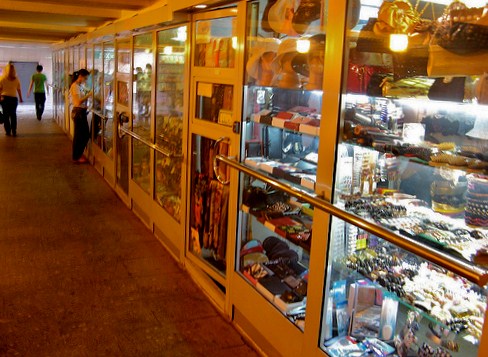 Useless shopkeepers hide here We find the left luggage room easily and leave our suitcases behind, then decide to head for an internet café. I want to shift money around my accounts and the others want to check email and Couchsurfing requests in cities ahead of us. I cannot login to the internet banking for the card that was stolen. I figure this must be a temporary thing until I contact the helpdesk. So now I have to make an international call to Australia. My mobile will not call the number. I go into a mobile phone shop and ask how I can call international. They explain you just can’t on my mobile phone and that I need a ‘taksofon’ card to use in the public telephones you find on the street. This starts an hour mission of me becoming increasingly angry with incredibly unhelpful Russians as I wonder why my internet banking is disabled.
<in Russian> “You have taksofon cards?”
<in Russian> “No.”
<in Russian>”Where are taksofon cards?”
<in Russian> “I don’t understand.”
This would be followed by them immediately looking down and away from me in such a way as to suggest that if I was a burning panda they wouldn’t care – unless I was buying something from them. When I finally find one its just five metres from the last disinterested shopkeeper I had asked. I make a point of showing it to them while pointing and saying,
<in Russian> “Where taksofon card? There…there.”
To which they return a nod saying they knew all along, they just didn’t give a crap about some dumb tourist speaking bad Russian. I begin further developing my plans to make an apartment-egg killing spray to apply to Moscow generally in order to try and start fixing this place.
 I was convinced that local shopkeepers would buy kittens just to strangle them to death So I take the card to a phone, read the instructions and start dialling. There is a long pause, some strange sounds and an engaged signal. I eject the card and try to start again. It is not accepted again. The card has been used up somehow. I wonder if I can use the handset to rearrange the phone, the phone stand and possibly the face of the guy who just gave me this card. I decide to take another path entirely and start walking back to the hotel I stayed in for my first three days. At least they speak some English and will be able to help me.
I’m as nice as I can be given the circumstances and the young Russian guy behind the desk in the business centre tells me to use the fax and just call wherever I want. I call the helpdesk and ask why I can’t login to my internet banking. They say I need my account details to make the login. I explain where I am and he reads everything out to me over the phone. So I sit down at one of the computers to try and login again. Nope. Not today, not tomorrow, not ever. I ask to use the phone again and by this time the young guy is on my side with a dry humoured look on his face.
“It’s okay, just call as much as you need.”
I get back onto the helpdesk in India and this time they flatly tell me that my internet login has been cancelled. I can re-enable it when I get my new card. I explain I’m in Moscow and that might be a little difficult. He then says because I’m overseas they wont even send my new card until I get back to Australia.
“So what you’re saying is you are doing everything in your power to prevent me from accessing my money for the next six weeks??” I start to lose any form of sensibility now.
”My money that I’m being paid to be on holiday here will now be completely inaccessible for the entire trip. That’s tantamount to stealing from me.”
“I’m sorry, there’s nothing I can do sir”, the Indian man apologises.
“What else I can do? I’ve noticed a number of branches of this bank in Moscow. There must be some way you can help me”, I plead.
“They can give you some emergency cash”, he explains, “about five hundred dollars.”
“How am I going to do that since I don’t speak much Russian? And how do you expect me to survive on that for six weeks in Russia??”
He neither knows nor cares. At this point my thin grip on maintaining my temper is sliding away by the second and I demand to speak to a manager. No, that can’t be done, nothing can be done, go away little person and stop tying up my phone line. I hang up the phone informing them they will be hearing from me soon enough.
So now I sit down and wonder what the hell I can do for six weeks in Russia with absolutely no money. Lari and Don can help me out, but that’s not really fair and would mean I won’t be enjoying my time worrying about money. I remember I have two credit cards with me, both with plenty of spare space. I must be able to do something with them. In a flash of divine inspiration I realise I can transfer credit across to my other debit card and use it normally. I login immediately and do so, it works a treat. I then go to the Bankomat in the next room and withdraw money, no problem at all. I’m back in the game, on top of this Russian nightmare and ready to move on. Don, however, isn’t.
He’s just discovered from our helpful Russian man that the hostel he stayed in for the first night never actually registered him in Russia. We don’t know how serious this is and Don now wants to know if they can register him posthaste, or who can do it for him. The guy is quite certain that it’s very serious and we’ll get in trouble with local police soon enough, no matter explaining it to the passport control people when we leave the country. Since Don didn’t stay in the hotel, they won’t register him. A lengthy discussion ensues and we decide to get registered in Yekaterinburg tomorrow when we arrive.
So this just leaves the question of what the hell you do on a hot, summer afternoon in Moscow? My answer was to go over to Kievskaya train station, go for a brief walk and get on the hour and a half ferry ride across the city. This would take us to eight o’clock when there was a couchsurfing meetup to see a Philippino film. That sounds like heaven after the nightmare I’ve just been living. The boat ride will be a chance to calm down, have a cool beer and let the stress slide away. Of course, there’s no chance of that happening for us today.
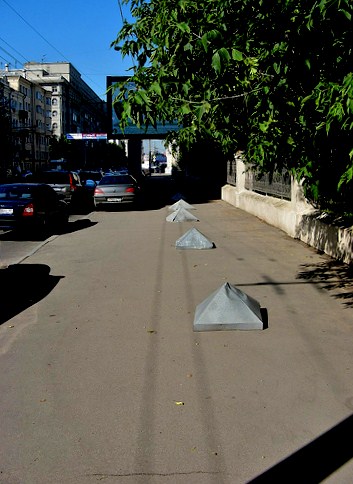 Pavement art or lazy builders? We embark on the boat on a hot summer afternoon and for the first forty minutes or so, that is how it remains. Then some serious storm clouds pour in over the horizon in record time. At around the halfway point of the trip we’re caught in a massive, chilly downpour; watching lightning crack over the city and around cathedrals and the Kremlin. The storm from two days ago in St Petersburg seems to be following us. Everyone on the boat is suddenly diving for cover and this is the point we realise we have to get off as soon as possible to catch a train across the city to catch that film. In the torrential rain, this doesn’t seem likely and we wait until the end of the journey, hoping the rain will ease. It doesn’t and we’re hurrying along flooded streets to find the all important Metro entrance while the last of the storm empties itself onto the city.
I had written down the extensive directions earlier, these are always necessary to find anything in the dense apartment nest that is Moscow. So we try to understand them and soon find ourselves huddling around a small piece of paper after two unsuccessful wanderings trying to find an elusive pathway. We have a small argument about whether we should just go to the train station and drink ourselves into a stupor before passing out in our cabin. I notice another stairway exit near the station and walk off, determined to be sitting down somewhere calm watching a film as soon as possible. It is the right pathway this time. We pass through an area filled with groups of people drinking beer together in front of a building. It’s not a pub or café, or even an event, but it looks like a pub atmosphere being created where these people have decided to gather. We push through a number of gates before finding the right carpark and it’s with near desperation I press the intercom number to be let into the building. We arrive happily and are welcomed into a little warm cocoon of happiness inside the day of pain.
Inside a group of people are spread around a small loungeroom, taking up every couch, chair and horizontal surface to get a view of the amply sized television. The film night is being held in the home of the Couchsurfing Country Ambassador for Russia, who I particularly want to meet while I’m passing through town. Deric certainly looks Philippino and a well turned out one at that. His short black hair is groomed immaculately and swept back over his head. He’s dressed well, but comfortably. He works at the Philippine embassy and enjoys hosting a lot of Couchsurfers, often many people at the same time. The film is from his home country and watching it with the aid of a cold beer is the best part of this endless nightmare day. After it finishes, we chat to everyone for half an hour before running off into the night. I ask Sasha the Siberian about my Taksofon card nightmare and he replies,
“They do it to me all the time as well, it’s not tourists they hate, it’s everyone.”
“So now we’re heading to your hometown, what should we do there?”, I ask him, curious for his tips.
“Go down into the Altai mountains, they are so very beautiful. You’ll be Couchsurfing in the city I assume, so they will look after that for you, but make sure you visit Altai.”
Thus instructed, we begin to make plans to spend a few days there as we make our hurried goodbyes and exit into the sodden streets of Moscow.
Once again we hurry through the Metro system just as we had been in St Petersburg twenty four hours earlier. We retrieve our luggage and complete a huge shopping trip for supplies for the twenty hour train journey. Bread, salami, hams, tomato and the odd beer. For the first time we acquire the dried noodle meals in a bowl that become a staple of our future train expeditions. Don and Lari’s bunks are the upper two in the cabin, mine is the lower one on the left and we share with a Russian man who speaks a little English. Once the train is moving towards Yekaterinburg we break out the food and eat sitting on the top bunks, offering food and beer to our Russian friend as we chat with him. He’s on a business related trip and is happy to have a chance to practice some English on the way.
It’s been a long, painful run for twenty four hours now and the image of the Demon’s eyes from the painting back in the Tretyakov gallery comes back to me. Somehow those eyes have come to represent Moscow for me. I slide into one of the most blissful and restful sleeps of the entire journey. The day of nightmare is finally over as Moscow gets further and further away from me.
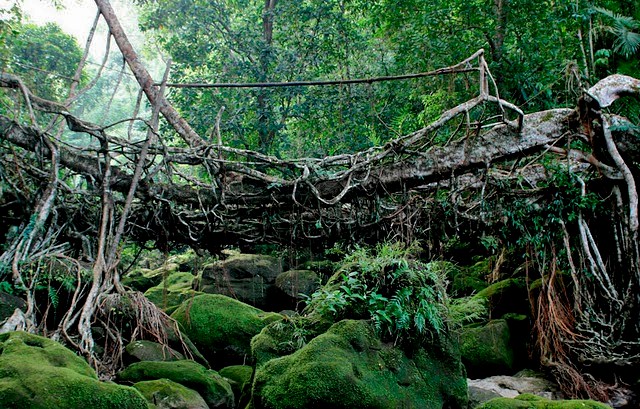
A couple of weeks ago a received an email that showed pictures of a series of amazing bridges in India that are actually grown rather than built. The bridges are grown from the roots of a rubber tree. To make them, the people use betel-tree trunks, sliced down the middle and hollowed out, to create root-guidance systems. When the rubber tree roots reach the other side of the river, they’re allowed to take root in the soil. Given enough time a sturdy, extraordinarily strong, living bridge is produced that can support fifty people or more.
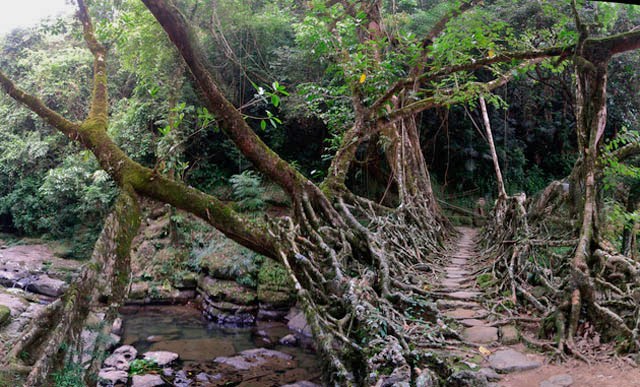 The pathways that connect... Some are over thirty metres long and take ten to fifteen years to become fully functional. Since the bridges are alive and still growing, they actually gain strength over time, and some of the ancient root bridges used daily by the people of the villages may be well over five hundred years old.
The idea is delightful and shows the way humans can work with nature to produce systems we can both live with. But there was something else happening here, I thought there was something I was missing. Then it came to me in a flash. These bridges are love. They are in every way a perfect description of the most indescribable idea. Let me show you what I mean.
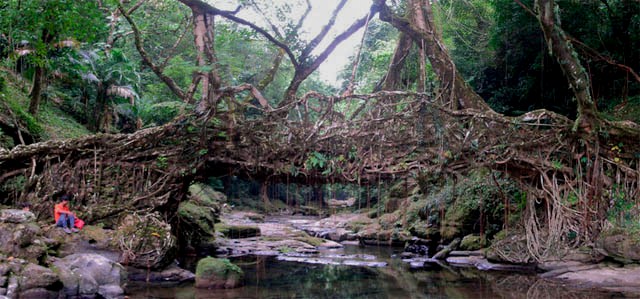 Islands in the stream become communities in the world If every person is an island, then here is how we bond to form a relationship and eventually a community. The love that grows between people works just like these bridges. It takes time to be able to grow them together and it takes nutrients and work from both sides to build it. It takes even more nutrients and work to keep it alive over a long time; but the results are always worth it. They form the pathway for communication and exchange, but also bind people together. Any kind of relationship needs time to grow and change and mature. The bridges do the same. A new relationship is relatively weak, before the roots can be planted in the soil of the other side to grow, they can be easily torn apart. As each person spends time caring for their side of the bridge and feeding the roots from the other side, the bridge grows stronger. The more time they spend growing that bridge, the stronger their connection becomes. They start to forget where one island ends and the other begins as the sense of oneness or togetherness becomes fundamental.
One person may well build a bridge with only their lover, their partner. Another person will build bridges with their partner and their families. Others will include close friends. The more love you have to put into your bridges, the more bridges you can grow. The network of islands that have bridges grown together form a community, a culture, a common identity. Ideas, feelings, hopes and desires spread through the community across these bridges with incredible speed. The stronger these bridges are in the community, the stronger the community as a whole becomes. To attack one of these islands is to attack all of the connected islands at the same time. Pain is carried across the bridges as quickly and efficiently as happiness. A strong bridge helps that island bear greater pain; more than one strong bridge allows that island to cross deserts unharmed or move mountains unchallenged. But no bridges means the island can become lost in the waves.
Not everybody can grow these bridges the first time they try. Some people will never be able to grow them, they just cannot give the love needed to let them take root. If the roots from one island make it to the other side, but do not receive enough care, enough nutrients, they will never take hold and eventually wither and die. Sometimes the roots only catch on one side of the bridge, one island gives the care needed for the other island’s roots to take nutrients; but the love is not returned. The bridge may appear to be strong at first, but growing from only one side, it is weak. The island that does not provide for it’s partners roots will eventually drift and tear the bridge to pieces. The pain is incredible for the island that invested so much love, but there is almost no pain for the island that gave nothing.
This is why some people think they have strong bridges built already; but do not. They do not see that they are providing all the love or none of it. Everybody today wants to believe the bridges are already built, that they can happen instantly; they can’t. It’s only when the bridge is tested for strength that you discover how well the islands have grown together. And it is only harsh weather and disaster that can test these bridges. I’m sure you already know the person or people you think you have one of these bridges with. Have the bonds been tested? Do you feed the roots all you can? Are you just taking nutrients from the other island without a care for returning your own?
I think everyone is able to make these bridges if they spend the time and effort to do so, but some people never do. If they’ve never seen a bridge like this between people, why would they build one for themselves? How do they ever have that idea? Everyone craves the connection and intimacy these bridges provide; humans are social animals. Then fear gets in the way of healthy growth. Fear of the unknown, fear of how the other island will use the bridge, fear you are providing all the nutrients, but receiving nothing. It feels safer to stay isolated. Especially in large cities, where everyone is so close together, but so far apart. You can throw a quick line out to someone and feel that you can withdraw it and feel safe again. The truth is that true strength, security and the ability to deal with any fear only comes when the islands are connected; and connected as strongly and as often as you can manage. Do you have some watering to do?
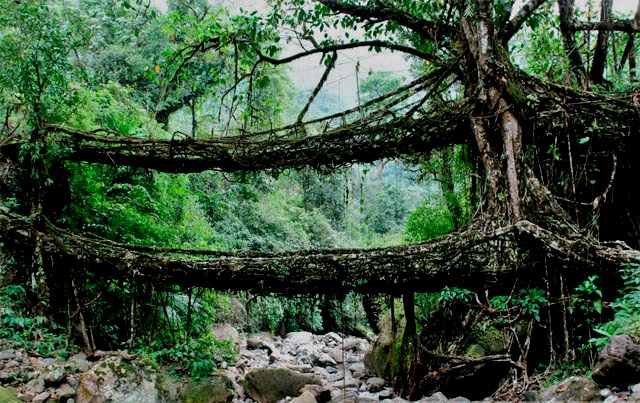 The ties that bind...
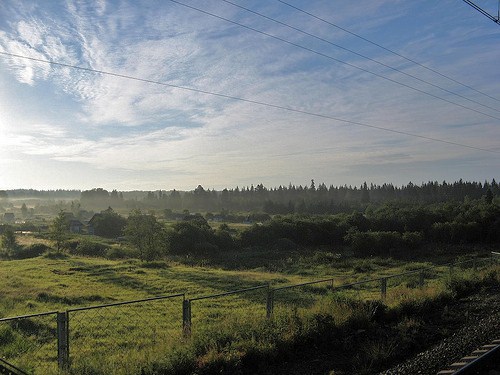 Near Moscow after sunrise.. So to bring you up to speed, it’s now about eleven o’clock at night and we have to travel back to Moscow overnight to catch our first real Trans-Siberian train to Yekaterinburg twenty four hours from now. We’re all sad to leave St Petersburg; it’s been our first stay together and we got to meet our awesome host, Alisha. I’m not looking forward to the train journey back to Moscow. Since I can only sleep sitting up if completely exhausted and even then for only an hour, I know I will be having a very long night. To make matters worse, we will also have a very long day in Moscow leading up to our departure at midnight tomorrow. With my thoughts focussed on how I’m going to deal with this night, we travel across the city on the Metro. Whilst changing lines in a city station, we’re waiting to get on the next train when it happens. The guy in front of me steps onto the train and stands immediately in the door, quite obviously pretending to look left at right. I get nervous straight away, something is wrong; which is when I feel my wallet go. I spin towards that side and Larissa says quietly,
“That guy just took something from you.”
I grab the guy who stopped me moving and he looks at me with mock innocence and genuine fear.
“Not him, that guy who just stepped off the train.”
I never see the guy who took it. It’s all over in five seconds. With his friend stopping and distracting me, he just swooped in through the carriage and has already exited. I look at the other guy long and hard, I could probably make his life difficult, but I have no proof and he knows it. I also have less than an hour to be on a train to Moscow. I let him go and shuffle my bags quickly off before the doors close. Don follows me.
We look up and down the platform and I realise the case is hopeless. I never saw him, neither did Don any more than being able to say ‘some guy wearing a jacket’. We look around the platform for someone running or even moving quickly. There’s no sign of him and no direction for pursuit. If I try to tell the police, I will be ensnared in paperwork for days, so instead I take stock of what was in my wallet. Actually, this isn’t as bad as it could be; the loss is four hundred roubles (AUD$20) and my main debit card. I have another debit card from my other bank and both my credit cards are safe in different places. I can just transfer money to my other debit account and continue on without a care, as long as I can notify my bank to cancel the card on principle.
I should take this moment to mention that almost all of the time that I’m awake in Russia I’m wearing a money belt under my shirt. Sometimes I leave it on when I’m sleeping on the trains. Inside it I have a waterproof plastic envelope into which I placed my passport and the Trans-Siberian train tickets. I also normally keep my main debit and credit card in it at all times. My second debit and credit card are hidden in the lining of my suitcase in another waterproof envelope. This way I could be mugged and continue, or lose my luggage and continue. Losing my main debit card now is annoying as I got lazy and didn’t put it back in the money belt. I keep under five hundred roubles in my wallet normally and after losing it I start to keep a bundle of cash in my money belt in true European style. The small notes were on the outside and the large notes in the centre so you can’t see how much money I really have. I’ll also often split it into two after visiting a Bankomat, keeping the thousand rouble notes separate from the main bundle.
We get back on the train and meet Larissa at the exit to the inter-city train station. We find our train and do some shopping; beer, orange juice, chips and absolutely no vodka – despite our best efforts to find some. You just can’t get it in the train stations. I send an SMS message to my mother to ring up the bank in Australia and cancel the card, and then turn my mind back to how I’m going to get through this night. I can finish the pickpocket saga tomorrow, I’ve done all I can, but what’s the plan for tonight? I decide the ingredients will be the bottle of vodka Don still has from duty free, the orange juice we just bought, a packet of menthol cigarettes, a notepad, a pen and some ugly attitude. I will use the first three to stay awake and the rest to write whatever comes to me in my increasingly deteriorating state.
 The long night One of the provodnitsas is walking slowly through the carriage saying something repeatedly in Russian. The provodnitsas are like the caretakers of each wagon. This one is making some kind of announcement, I recognise some words from my efforts in learning the language, but cannot put them together in any meaningful way. Whilst we get settled I talk to Don and Lari separately for their memories of St Petersburg; it’s really all about that ‘One Night in Pete’ on Saturday. While I’m still feeling dark, twisted and shaken from losing my wallet, I let the story come out. This works pretty well for a few hours and two refills of the half litre beer bottle I’m using as my glass of vodka and orange. A real Russian screwdriver in the north of Russia. I retrieve my mp3 player and choose a calm playlist to keep my mind flowing nicely. A couple of cute young Russian girls sit across the aisle from me and join me briefly for a smoke and a drink in the gap between two wagons. My Russian is terrible and they are very giggly. It feels like they are on their first big trip out of St Petersburg and I wonder what they make of this huge Australian guy in headphones, scribbling in a notebook between sips of vodka and trips to the smoker’s place at the end of the carriage. I don’t know what to make of myself either, so I put the notebook down and just go and stand in the smokers place and watch the world go by through the open window.
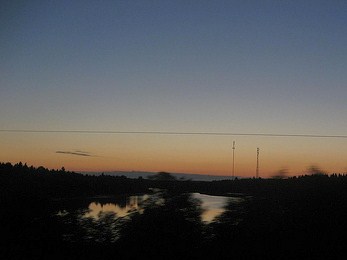 Dawn's first light A man arrives and is quite animatedly trying to tell me something important. He is miming sleeping; I’m trying to explain I cannot sleep in the seats. He tries a few approaches, but I just cannot make sense of it. I feel especially frustrated because I am recognising words, but not enough of the right words to put it together into something sensible. After he’s been gone for five minutes it all becomes crystal clear. The announcement before and now him, there is a spare coupe berth. For some extra money I could have been lying down sleeping in a cabin with two beds for this entire journey. And yet, right now, I feel more inclined to stay up anyway, I feel like there is something I’m meant to see. I could pursue the man to find the cabin, but instead I lazily smoke another cigarette and sip from my bottle of screwdriver as some beautiful five part a cappella music becomes the soundtrack of my life.
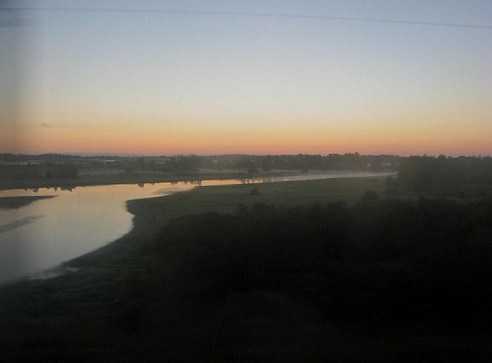 Sunrise is coming... It is now almost four in the morning and the sun is starting to rise through the endless pine forest we are traversing. I’ve switched to some loud and addictive psychedelic trance music to help keep me awake. An extra layer to the sound is drawn from the constant musical rhythm of the train clicking over the tracks. The moment is mesmerising. I keep breaking into dance moves in this bare metal cabin stained with cigarette ash and smoke, enjoying the flow of music that melds easily with this glorious scenery. I see mists over slow moving rivers that we cross gently on wooden bridges during the first folds of morning’s embrace. I wander back to the wagon and find my camera to try and capture the beautiful scenes the morning light is revealing. I return to the smokers place and spend a while lost in the functions of my camera trying to get it to snap good pictures from a moving train successfully in low light. After a while the sun rises higher and solves my photographical issues; only the drunken, sleep deprived ones remain now. I have all the windows open and spend a long time lost in this entrancing milieu of morning, music, forest and train. There are lakes encircled by ancient pine trees that seem to be breathing the mist into the frozen morning air. The sky changes slowly through reds and oranges as the sun’s heat catches the formless mist and dissolves it like a half forgotten memory of childhood.
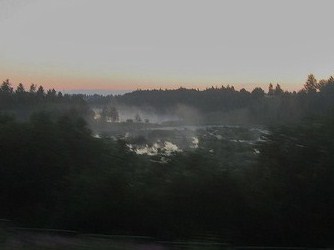 Mists of Dawn I realise my temporary glass is empty again and struggle back into the world of the wagon to refill it. I realise I now have only enough cigarettes to smoke one every half an hour before we arrive. I shuffle back to my viewing position in the smokers place to watch the strange combination of ancient wooden houses and log cabins being suddenly dominated maliciously by soviet style apartment buildings here in the middle of the Russian countryside. The apartments come as a horrible shock after the beauty of the morning spent lost in a natural bliss. There are amazing villages of only wooden houses, with bridges made simply of logs lashed together crossing streams by the train’s route. Then just as you are wondering who these people are that live in these idyllic surrounds, that you know haven’t changed in a few thousand years; there is suddenly the rectangular, sharp horror of one of these apartment buildings. It’s like someone went into space with a collection of them and just threw them down randomly across the countryside. There’s never more than one at a time, always separated out like some strange egg left by a giant crazy robot insect that exists only to breed more of these terrible buildings. It gets worse and worse as we draw closer to Moscow, the buildings become more frequent and somehow even more repellent to me.
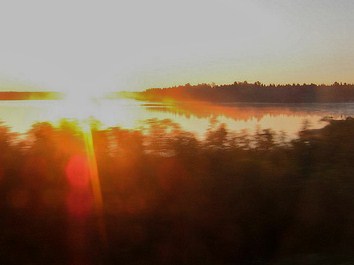 ..and in a blinding flash, it appears... I realise I’ve now been awake for far too long and things are started to bend and warp for me. Time and place is distorted. My mother sends me an SMS telling me the card has already been cancelled from being used in a Bankomat with the wrong PIN number. She leaves me a reference number for the report as well. I now realise that friends in Australia will be waking up and send a flurry of SMSs as we pass through towns that have mobile phone towers in them. I’m looking for someone to distract me from the endless call of sleep and these horrific insect egg apartments. Call me up! Ring me now! One friend does. I’m standing in-between two carriages on a train now less than three hours from Moscow talking on my mobile phone to a friend in Melbourne. I tell him how much I’m still loving Russia even after the St Petersburg pickpocket. We talk a while before he has to go and start actually working. I feel rejuvenated for the contact and stare out the window again. There are getting to be more frequent apartments and less beautiful nature, so I return to the cabin wondering if someone can actually make an apartment egg killing insect spray to stop these things from taking over. The journey into Moscow proves the infestation is beyond control.
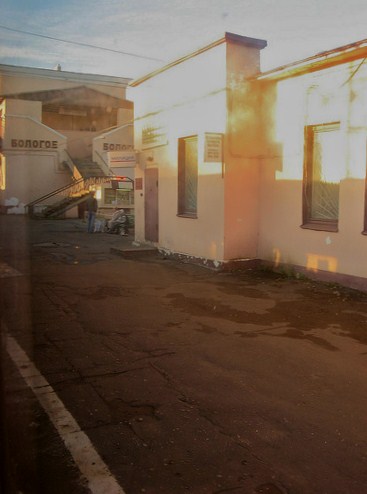 The station drifts past me in the morning light... I sit for a while and stare at the notebook pages. I’m incapable of writing right now, there’s just no way I can make my brain put words on paper. I sip my vodka and try to decide if I will have one more refill before we get into Moscow or not. Don stirs and I talk to his semi-conscious brain for a while and settle it back to sleep. I move to see how Lari is doing, her eyes are open, but clearly not much functioning is happening behind them. I tell her what’s been going on and decide I will fill my bottle one more time before the provodnitsas catch me at it.
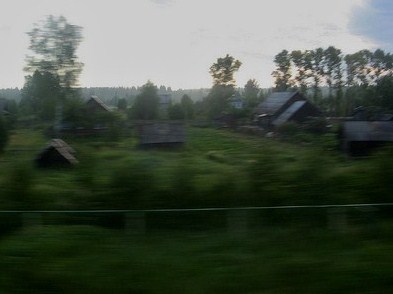 Wooden houses crouching by the train line... I don’t think they will really care, but I’m still feeling like I’m in Australia and someone in uniform is bound to tell me I can’t do whatever it is I’m enjoying at the moment. I have completely failed to effectively ration the cigarettes. I now have three left and a bit over an hour to go. I decide this will be the last vodka and finish one of the cigarettes to celebrate. Damn. I return to the wagon and check everything is ready to exit the train smoothly for what is going to be a strange, long and twisted day in this city. Don and Lari are awake now and I am smoking the last cigarette as we walk down the platform in Moscow looking for the left luggage room.
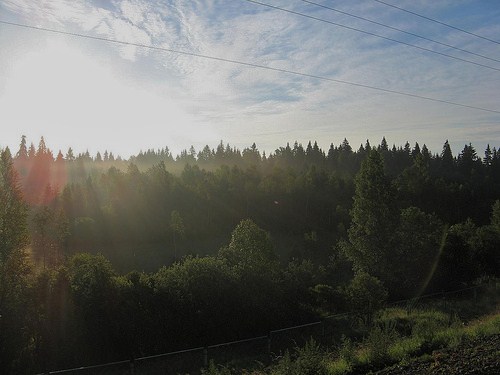 Sunlight fingers through the last mists...
After the storm the previous night, we awake to a fine day. Now, Peter the Great built his Summer Palace, Peterhof, as a response to the French palace at Versailles; he was determined to make this its equal. It cost more lives than Versailles did to construct, but it is truly magnificent and helped put St Petersburg firmly on the map of the great European courts. We saved our visit there for our last day in town and decided to take the hydrofoil boat out there. As we travel out of the mouth of the Neva river we can see Alisha’s apartment building and the foreshore in front of it. It seems strange to see this view from the other side now.
 The shadows of the now scattering clouds cover blue and green stretches of the calm sea; forming glistening marbled patterns that stretch to the horizon. As we draw close to the dock we have our first glimpse of the canal cutting through the gently sloping land that leads up towards the palace itself; with the central group of fountains visible in the distance. The canal was originally the place where the Tsar’s boat would be manoeuvred and secured when visiting the palace grounds. I can imagine the sheer spectacle this would have made for visiting dignitaries almost three hundred years ago and appreciate its grand style. The Grand Cascade draws you in and up the paths either side of the central canal, beckoning with fingers of water sprays and sunlight.
  The centrepiece now is the statue of Samson wrestling a lion that was added long after Peter’s death. The water jet from this fountain is the highest in the park, pushing water high above the magnificent statue and into the blue sky above. The multiple waterfall cascades and rows of golden statues of women become shrouded in the mist of water sprays from the numerous fountain jets. Rainbows form and fade constantly in the mottled sunlight from the dappled clouds hanging in the sky. As you walk near and past the cascade, the rainbows jump from place to place as thought they’re playing in the water. The whole spectacle is apparently powered only by the water cascading down the hill from the upper gardens, there are no water towers or pumps to be seen or heard anywhere. I feel immediately calm and relaxed here, even surrounded by throngs of people, families surging in different directions; you can’t help but feel peace in the Summer Palace water gardens.
  We drift through them for hours, there are so many different areas with different types of gardens and fountains nestled within them. From ordered hedges housing golden statues from Greek mythology to the Grand Cascade directly in front of the palace; the place is a wonder of landscaping. In a central grove, surrounded and shaded by tall, broad leafed trees, is a strange artificial tree with fountains and sprays of water spreading in all directions. In front of it, a bench seat is placed such that anyone sitting there, or standing nearby, will be showered with short bursts of water as part of a cycle. Children run back and forward in front of it risking a sudden dousing. Each time someone gets caught, laughter fills the air as everyone shares the moment of surprise and shock. It’s another warm, sunny day in Russia and the cooling effect of the water sprays filling the air leave us all in the mood to frolic. We drift through them for hours, there are so many different areas with different types of gardens and fountains nestled within them. From ordered hedges housing golden statues from Greek mythology to the Grand Cascade directly in front of the palace; the place is a wonder of landscaping. In a central grove, surrounded and shaded by tall, broad leafed trees, is a strange artificial tree with fountains and sprays of water spreading in all directions. In front of it, a bench seat is placed such that anyone sitting there, or standing nearby, will be showered with short bursts of water as part of a cycle. Children run back and forward in front of it risking a sudden dousing. Each time someone gets caught, laughter fills the air as everyone shares the moment of surprise and shock. It’s another warm, sunny day in Russia and the cooling effect of the water sprays filling the air leave us all in the mood to frolic.
The trick fountain frolics
 I had wanted to see the pyramid fountain since I’d heard of it from a friend who visited these gardens. It doesn’t take me long to find the track to the small grove that houses it. We pass by a huge statue of Peter mounted on a rectangular base about two and a half metres high. It’s surrounded by a crowd of people trying to flick coins up onto the small flat surface of the base near his feet. If the coin rests on the statue somewhere, you make a wish. This proves to be no mean feat, as I try a number of times with all the coins in my pocket. I only succeed once. I think the real winners are the small children swarming around near the base, recovering fallen coins and trying to land one on the statue themselves. I’m sure we paid for their ice-creams that day. I could see myself bringing my family here on just such a day to wander and play around without a care in the world. I had wanted to see the pyramid fountain since I’d heard of it from a friend who visited these gardens. It doesn’t take me long to find the track to the small grove that houses it. We pass by a huge statue of Peter mounted on a rectangular base about two and a half metres high. It’s surrounded by a crowd of people trying to flick coins up onto the small flat surface of the base near his feet. If the coin rests on the statue somewhere, you make a wish. This proves to be no mean feat, as I try a number of times with all the coins in my pocket. I only succeed once. I think the real winners are the small children swarming around near the base, recovering fallen coins and trying to land one on the statue themselves. I’m sure we paid for their ice-creams that day. I could see myself bringing my family here on just such a day to wander and play around without a care in the world.
  We continue down a long pathway with a row of tall trees either side that meet in the middle to provide a welcome mottled shade from the early afternoon sun. I pause to try and get a photograph capturing the pathway stretching into the distance, when I notice there seems to something more than simple daylight at the end of this green tunnel. As I move down the path, it slowly reveals to me that the daylight at the end is moving. As I cover the last thirty metres or so, it resolves into a beautiful pyramid made only of white, bubbling water. Water pipes laid in concentric squares are pumping water at different pressures to create the effect. I want to approach and feel my hands play into the streams of water, but fencing and severe signs suggest this isn’t a good idea. I decide the view is enough and drift slowly back to the seashore.
 The three of us sit down for a beer and discuss if we’re going to make it to the upper gardens and inside the great palace itself. None of us really care by now, it’s the fountains and garden that drew us here and walking inside any building seems somehow a poor second option. We climb the stairs past the dragon fountain when Don notices an empty statue base. He thrusts his camera towards me then scales it like a spidermonkey to stand on top looking particularly regal. We laugh at Don exercising his inner dictator and then turn to admire the view of the open gardens below. The three of us sit down for a beer and discuss if we’re going to make it to the upper gardens and inside the great palace itself. None of us really care by now, it’s the fountains and garden that drew us here and walking inside any building seems somehow a poor second option. We climb the stairs past the dragon fountain when Don notices an empty statue base. He thrusts his camera towards me then scales it like a spidermonkey to stand on top looking particularly regal. We laugh at Don exercising his inner dictator and then turn to admire the view of the open gardens below.
Apparently the Dragon fountain is in this picture somewhere
 Someone wearing a jester outfit is playing a violin to bemused children. Couples walk hand in hand betwixt the tree covered pathways; enmeshed in rays of soft sunlight caught in the gentle mists of the fountain spray. An old man sits placidly on a bench watching his grandchildren run and play around a fountain. Occasionally they run to him with news of their adventures and he listens before sending them on their way with a few words. We move across to the huge open walkway between the great palace and the top of the Great Cascade. A wedding party poses repeatedly in front of the golden statues, the photographer abuzz trying to capture individuals and the whole group against the majestic background. A light wind gust carries the spray mist over them and the bride suddenly has tiny droplets of water covering her raised veil, creating jewels that sparkle in the golden sunlight. I pause to watch other couples spaced around the top of the cascade kissing each other gently as they enjoy the view. Someone wearing a jester outfit is playing a violin to bemused children. Couples walk hand in hand betwixt the tree covered pathways; enmeshed in rays of soft sunlight caught in the gentle mists of the fountain spray. An old man sits placidly on a bench watching his grandchildren run and play around a fountain. Occasionally they run to him with news of their adventures and he listens before sending them on their way with a few words. We move across to the huge open walkway between the great palace and the top of the Great Cascade. A wedding party poses repeatedly in front of the golden statues, the photographer abuzz trying to capture individuals and the whole group against the majestic background. A light wind gust carries the spray mist over them and the bride suddenly has tiny droplets of water covering her raised veil, creating jewels that sparkle in the golden sunlight. I pause to watch other couples spaced around the top of the cascade kissing each other gently as they enjoy the view.
We end up heading back to the dock to catch the last hydrofoil back to the city. This also gives us one more chance to practice the Russian summer sport of queuing and sweating. There is one person selling tickets for the hydrofoil from one small wooden ticket box placed near the edge of the jetty. When we join the queue there are already dozens of people in front of us, but this has no effect on the serving woman. She seems to enjoy a bit of a chat with every person and moves with the sure speed of a diseased tortoise. I’m particularly impressed by the way she has to check the roll of tickets every time she picks one to make sure they haven’t turned into something different in the intervening ten seconds. I see she is a consummate professional of the sport and wonder if there’s any way we can beat her.
Don volunteering to refill this pond
The boat arrives and we all become more agitated as we know this is our last chance to get on it and we feel sure it will leave just as we reach the front of the queue. The tension mounts as we check we have enough small change and prepare the right money. I notice a second ticket box with someone inside it waiting. Nobody is paying them the slightest attention and I wonder if we have a short path to take so we can win the event. I read the signs on the box repeatedly; they speak of other boat trips, but not of the hydrofoil. Apparently out here on the dock at Peterhof I can buy a tour of the city canals. There’s only five more people to go before the fateful moment of our interaction and it seems moments before Lari ends up taking the first ticket. She strolls off towards the boat as I acquire my own. I suddenly feel the urge to shove the whole box into the sea, jump on top of it and row the damn thing back to the city using a plank from the roof while this useless creature within struggles and complains the whole way. I decide the hydrofoil will be quicker, if less satisfying, and follow Lari onboard with Don shortly behind us. Only another ten people make it on after us and we feel relieved as the boat pulls away; knowing our queuing skills could probably do with more practice.
 Everyone takes a picture
I decide to head home to attempt to get some sleep in the early evening to make the sleepless night sitting on a train easier to cope with. Don and Lari stay to explore the city a little more. Alisha returns with them after ten and they’re looking at what food we have left. Don waves his hand at the pile of vegetables and meat and tells me to do something clever with it. The times we’ve shared houses together saw me cooking for him fairly often as I dodged as much of the cleaning duties as was feasibly possible. I manage to cook up everything in the fridge to create a lightly spiced stir fry dish with noodles. It is surprisingly good and filling enough to cushion my system for the long night ahead.
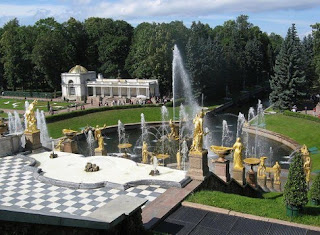 Don is trying to copy all his pictures onto Alisha’s computer so she can see what we’ve been up to and how she looks in all of them. It isn’t working so well and he asks me to figure it out for him. My ten years working in the IT industry are of some use and I manage to affect the transfer of his pictures. I then attach my camera and copy my own across for her. I retrieve the scarf my family gave me and get a picture with Alisha wearing it along with her Georgian man hat. She says she needs a cigarette to complete the picture and lights one instantly to pose again. Her slow, warm smile glows at me and I give her a huge bear hug to farewell her properly. As the picture copying process finishes we all leave Alisha the gifts we’ve brought along. Lari has some scented soaps handmade by a friend of hers back home which form the start of our love package. I choose a stubbie holder with an Australian aboriginal colour painting on it, a shot glass with Perth’s city skyline on it, a yellow diamond sign warning about emus and also a stuffed kangaroo. Don adds some koala fridge magnets and some Australia stickers and we present it all to Alisha to thank her again for being so magnificent. She looks terribly shy, but she likes the crazy array of presents and gives us all another hug. We make our final farewells and take our luggage out the door in plenty of time to make it to the train station.

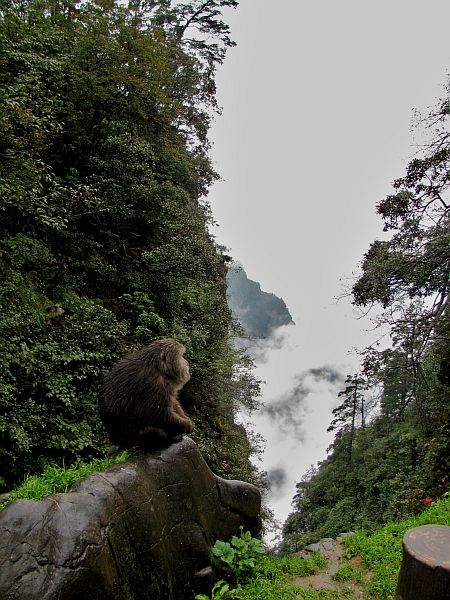 Calm monkey action. I suppose you’re wondering where I got the picture of the monkey at the top of the page there. More to the point, the more dedicated observer would notice there are three monkeys that change places each time you come to this website to read stories. Well, the truth is they are the prototype for the flying robot monkeys that I will use to take over the world when my orbiting battlestations are complete. Nature made these ones, but they are part of the blueprint for my campaign to establish myself as world dictator with my penguins by my side. Okay, so that might not be an entirely accurate explanation of why I chose those pictures. I just wanted to remind you all that when you see the flying robot monkeys descend from the skies wreaking havoc and sweeping all resistance before them like autumn leaves; just say ‘Oh Hi Dhugal’ and they’ll leave you alone. They may dance a little for you first, or offer you a beer, because that’s how they’ll be programmed; but they will spare your lives.
In any case, these pictures are of one monkey that I found sitting at the very top of Emei Shan in Sichuan province, China. This mountain has been a site of spiritual meditation for religious types for at least a couple of thousand years. Once you walk along the paths away from the spots filled with Chinese tourists, you will understand why. The place has a feeling of natural beauty, peace and wonder that makes you feel like profound revelation is a moment away.
Walking along the middle level pathways of the mountain, I’d left the tourist hordes behind an hour ago when I drift into an almost magical place. I approached it along a narrow pathway winding along the side of a river valley covered in lush vegetation and sheltered by tall, spreading tree canopies. The river water burbles and rushes by my side; it travels downhill as I climb my mountain. I come around a corner, where the valley pushes a little deeper into the river’s path, and discover a waterfall. The sun shines gently off the smooth cascade and leads me to notice the bridge crossing over the top of the waterfall. It is a Chinese canopied bridge with a temple style roof atop wooden pillars and wooden bench seats along both sides of it. When I arrive in the bridge’s shelter and look down the valley, watching the river turn the corner I had just come around, I know I have to stay here a while. I sit on the bench seat with my back to the way I had come, looking instead at the narrow trickle of water coming down the mountainside and flowing under the bridge on which I sit. Thick undergrowth clamours at the edges of stream flowing down the hill. If my past is behind me, then the future is hidden at the top of the mountain and obscured by forest.
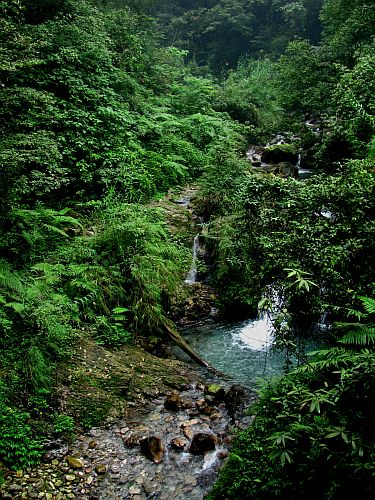 The River Valley I sit on the wooden bench and lose myself in the absence of thought. Time evaporates like dew off the leaves of the ferns that surround me.
A rock in the sunlight.
A reflection of a leaf in the water.
The shadow of a tree on the riverbank.
Brown wooden bench with scratches of age and use.
Faded paint.
A breeze gently brushes the smallest weed as it pushes the largest tree.
A body breathes, I am somewhere else.
I feel like I’m on the edge of epiphany. Maybe I’ve already been past the edge and I’m just trying to attach words to the feeling. There’s nothing in my heart and mind but the kind of harmonious peace that people would pay a fortune to possess. I feel myself returning to the world of time and place and send an SMS to a friend in Melbourne saying what just happened and the feeling of being on the edge of epiphany continues. He replies with his normal simple wisdom.
“That’s why they built it there.’
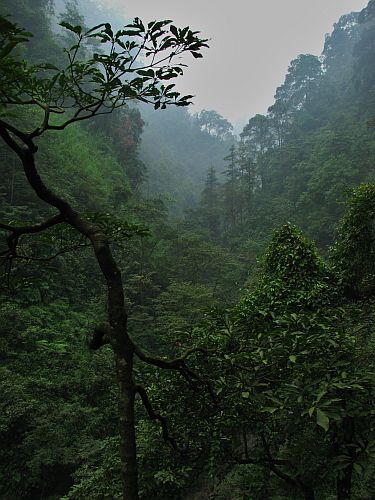 Returning along the valley... Looking at my phone tells me I’ve just lost the best part of an hour sitting here, I consider staying longer, to return to that state, but I know the evening will bring an intense cold that I don’t want to be caught in. As I’m walking back to the pathway I wonder why I’m placing temporary personal comfort higher than that feeling of absolute, timeless peace. I also begin to feel hungry and can picture a plate of spicy Sichuan style pork with steamed rice and a cold beer. It still takes a couple of hours to get to the bus that will take me back down to the town at the base of the mountain where I’m staying. When I finally get back to eat and drink, I feel another kind of contented peace settle over me that lasts until I fall into bed to rest.
Just before I sleep, I’m thinking about that feeling of epiphany again. Like you’ve just experienced the kind of understanding or realisation that makes people start religions, conquer empires and generally change the way the rest of humanity sees itself – once its been explained. And explaining the nature of epiphany is as supremely difficult as explaining the epiphany itself.
“I just saw the face of God and now I see what we all must do”, sounds just as crazy to me as,
“Everybody is basically layers of paper and I just need to peel them off to find the truth.”
Both are the kinds of things proper schizophrenics are likely to say and the more active will put them into action; starting a cult or a series of attacks on individuals trying to remove their skin. Epiphany can be dangerously crazy as much as it can represent the ultimate enlightenment.
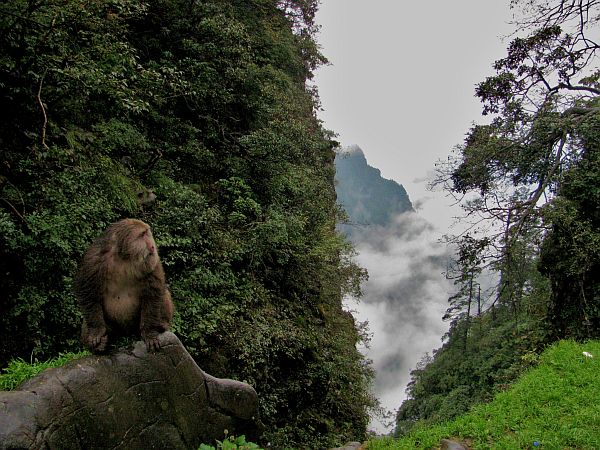 Epiphany is for monkeys too... The next morning I travel to the very top of the mountain. This time I cheat and take a bus for an hour that takes me up most of the way. Then I swap to the cable car for the last jaunt to the Golden Summit. My legs are aching sacks of meat. On the bus ride I figure out I walked between ten and fifteen kilometres; not so bad. What’s killed me is that also involved half a kilometre of altitude change. At one point I walked down sets of stairs that dropped me three hundred metres over just one kilometre. The pain in my calf muscles is exquisite today. I then begin to wonder how much that had to do with that moment on the bridge and the second calmness of feeling full, warm and sleepy. Was my body just full of endorphins from the hefty and painful exercise? A drug like any other, but produced internally for our own pleasure when the body is dealing with things that are hurting it. It’s also this drug that gets released at the point of orgazm; so we turn pain to pleasure and pleasure to …well, orgazm.
So the reason I’ve come to the top of the mountain today is to try to experience at least one of the ‘Four Wonders of Emei Shan’. So after the two hour journey to the top of the mountain, I’m greeted by a thick fog, through which you can barely see ten metres ahead. I keep telling myself its still early morning, only just after eight now, and the fog will pass to reveal the wonders. It doesn’t, so you can read about the four wonders somewhere else, I never saw them. Now a foul mood begins to descend on me. I’ve travelled all the way from Australia, woken up at some unheard of hour of the morning to scale this mountain and it doesn’t even have the decency to unhook its dress and show me some wonders. I stalk around in the fog and mist taking pictures of whatever I can, planning to leave as soon as possible.
I send a heap of messages to friends asking them to help me convince the world to give me some clear skies so I can at least see a cloud sea from up here; something I’ve always wanted to experience. I have some fun exchanging messages with a few people and wait for an hour or so to see if things will improve. They don’t and I stalk back down the mountain wondering where else I can go to find a cloud sea. I discover the path back to the cable car is different to the one I took from it and naturally leads through half a kilometre of fucking souvenir shops. I am at a top Chinese tourist destination and I really should have expected this. After the disappointment of not finding a cloud sea, this is like rubbing in the salt and I feel my mood move from foul to venomous. Now I want to spread this poison to someone else and I start looking for targets.
I’m busy looking for an over enthusiastic shop owner whose time I can waste for half an hour pretending I’m going to buy something really big. This means he’ll miss any real opportunities from the morning crowd and I will walk away at the end feeling happier; with the poison shifted from my fangs. Then I notice a bunch of Chinese tourists lining up to have their photos taken with the local monkeys; macaques that have lived here forever. They buy food in little paper bags and give it to the monkeys to distract them. Then they stand next to the monkey in small groups with their two fingers in the air to take the standard Chinese picture. I start thinking of a way I can fuck with this tourist horror story of profoundly unhealthy monkeys being exploited by….
In a moment the whole scene changes. The poison evaporates from me in a few moments, leaving a mellow cloud in its wake.
Through the valley behind the monkeys is a magnificent cloud sea leading off into the distance. The sea later joins to the clouds forming a strange juxtaposition and confusion of what is land, sea and sky. My feelings are unravelled and my mind bends awkwardly. How could I be so upset over nothing? That mood could have easily made me miss this natural wonder. Why was I so consumed by it so quickly? Especially after the wondrous glory of yesterday.
There, perched on a smooth stone, is one of the monkeys with his back to the tourist crowd. He’s just staring out across the valley, oblivious to what’s going on around him. I manage to catch a picture of him before a Chinese family start yelling at him and throwing nuts to get his attention. It takes a while for him to notice them anyway. Then he turns half way around and slowly looks at them, then looks back across the valley. I catch him in a second picture. Finally they land some nuts on the stone next to him and he picks them up and starts eating them. I take the third picture.
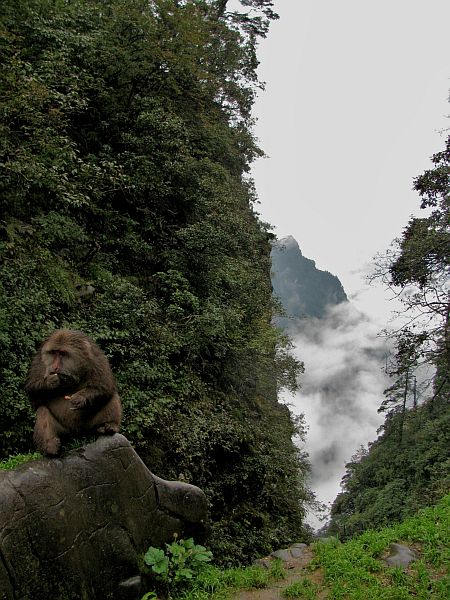 Monkey nuts taste best Yesterday I was feeling absolute peace and got distracted by my comfort zone calling me. Today I feel I’m watching a macaque having the same experience. Can this be true? Am I such a little monkey to be so easily turned and driven by my comfort zone? Does the monkey even understand the beauty of the cloud sea? Is it just sitting there staring into space with no thought in its head at all? Has this monkey actually achieved a kind of enlightenment? Is the real trick to enlightenment managing to calm and harmonise the many different comfort zones a human mind drives us to? What is the lesson of the monkey?
I look at the pictures again and notice that the monkey isn’t looking at the cloud sea at all. He’s so close to looking at it, but does not see it. I want to turn his head to show him, I want to know if he’s even capable of seeing it, I want to make him be able to see it. Why do I want this monkey to see the cloud sea? I dont know anymore. It’s like I want him to see what I see, then be able to talk to him to see if he feels what I feel. Does he feel like the world just got torn apart and put back together in a new way? Could he ever understand that? Could another human even understand that? Now we’ve got to the centre of it. The monkey is so close to looking at it, but he does not see it. He does not know to turn his head that one extra degree to see it. He needs something else to make him turn his head that one extra degree, some other external force has to make him move.
I’m frozen in my spot now, paralyzed by endless waves of thought; introspection and consideration. The Chinese tourists arrive and leave in groups, feeding the monkey for the photo opportunity and then leaving without a thought. There is an idea that humans aren’t born with souls, that a soul can only be grown through the process of self-exploration and self-realisation. The reason most people never develop a soul is that they are so continually distracted by everyday life, by their comfort zones, that the opportunity for that self-realisation never arises.
Are these the soulless masses that surround me now? They surge in crowds, herded by tour guides and stop only at the official places for photo opportunities. Those spots also feature people selling food, drink and random other junk. The only difference between this place and a Chinese city street is there’s less buildings and a much better view. I feel like I want to throw the shops over the side of the mountain and yell at the people to think about the monkey.
The idea of this huge foreigner trashing the markets and yelling incoherently in English about watching the monkey brings a strange smile to my face. Then I see it, know it, feel it absolutely. The Four Wonders of Emei Shan are just lures to bring you to this place. The cloud sea is one of them and is truly amazing. They are, however, the distractions as surely as the peanuts are distracting this monkey. What’s important isn’t the place, the people or the time. It’s that feeling. Being on the edge of epiphany, not because you’re waiting to cross over; but because you’ve just returned.
|
A sample text widget
Etiam pulvinar consectetur dolor sed malesuada. Ut convallis
euismod dolor nec pretium. Nunc ut tristique massa.
Nam sodales mi vitae dolor ullamcorper et vulputate enim accumsan.
Morbi orci magna, tincidunt vitae molestie nec, molestie at mi. Nulla nulla lorem,
suscipit in posuere in, interdum non magna.
|
|



































